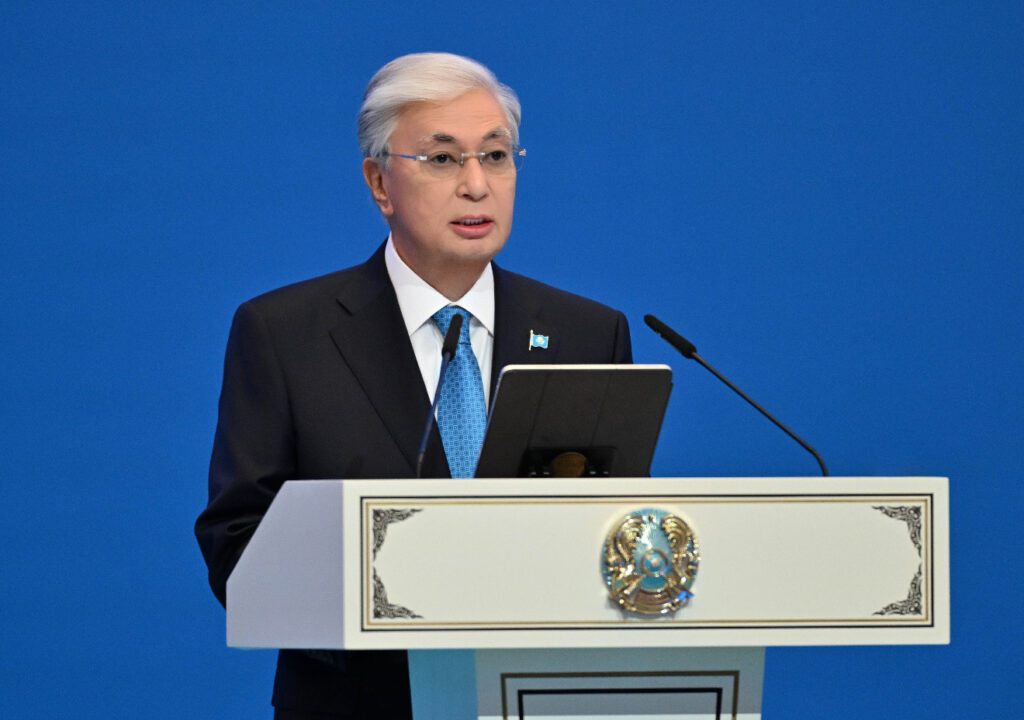President Kassym-Jomart Tokayev of Kazakhstan highlighted the University of Arizona’s growing partnership with his country’s Kozybayev University as an exemplar for collaborative education and research at an event last month.
Tokayev’s acknowledgment, at the Forum of International Strategic Partners in Astana, Kazakhstan, held on Oct. 30-31, underscored how the U of A’s microcampus network, which began as a dual degree initiative, is expanding to include comprehensive international activities such as research and workforce development partnerships that align with the U of A’s international engagement strategy.
Speaking before an audience representing more than 40 international universities, global corporations and government ministries, Tokayev pointed to the U of A-Kozybayev partnership as a leading example of how higher education can contribute to national innovation goals.
He highlighted a joint research project, led by U of A chemistry and biochemistry professor Jeffrey Pyun and Kozybayev University researchers, that focuses on transforming Kazakhstan’s abundant sulfur reserves into high-value polymeric materials. Tokayev cited the initiative as a model for how academic collaboration can address economic and environmental challenges through applied research.
“Our task is to ensure a direct connection between education and science and the real sector of the economy. There are successful examples in this direction,” Tokayev said. “Thanks to the partnership of Kozybayev University with the University of Arizona, an advanced technology for turning sulfur into innovative polymers has been developed. This is a very necessary project for our country, which has large sulfur reserves. This project will give a serious impetus to the development of our chemical industry and, what is especially important, will contribute to the solution of a number of environmental problems.”
Attendees at last month’s forum included, from left, Yerbol Issakayev, rector of Kozybayev University; Aruzhan Yermukhan, dual degree student studying information science at the U of A microcampus at Kozybayev University; Jenny Lee, U of A vice president for Arizona International and dean of international education; and Ricky Salazar, senior director for Central and South Asia affairs in Arizona International.
Jenny Lee, vice president for Arizona International and dean of international education, said solutions like these are precisely the outcome the university strives for with its international partnerships.
“President Tokayev’s acknowledgment is a powerful affirmation of the University of Arizona’s approach to international collaboration,” Lee said. “Our partnership in Kazakhstan exemplifies how our microcampuses are platforms for deep engagement, connecting students, faculty and governments in solving real-world problems.”
Building momentum across sectors
During the forum, the University of Arizona delegation, led by Lee and Ricky Salazar, senior director for Central and South Asia affairs, met with multiple ministries, including the Ministry of Science and Higher Education, the Ministry of Tourism and Sports and the Ministry of Healthcare. Each expressed strong interest in expanding cooperation with the U of A across education, research and workforce development.
Minister Sayasat Nurbek, who oversees higher education and science in Kazakhstan, expressed intent to visit Tucson for a strategic planning session aimed at deepening collaboration.
“Our evolving partnerships in Kazakhstan reflect the University of Arizona’s approach to international engagement and ongoing efforts to build meaningful, multifaceted collaborations with global partners that expand opportunity for our students and advance solutions with real impact in Arizona and around the world,” said Patricia A. Prelock, University of Arizona provost and chief academic officer.
A model for the future of global engagement
Beyond its initial academic focus, the partnership in Kazakhstan now represents a broader model for international engagement. The collaboration spans research initiatives, such as sustainable materials and environmental technology, and workforce development programs that align with Kazakhstan’s national priorities, including tourism and inclusive education.
It also highlights the strength of people-to-people connections that define Arizona International’s approach. One dual-degree student, Aruzhan Yermukhan, met Tokayev at the forum and shared how studying with the University of Arizona in her home country has shaped her path.
“I’m thankful to the University of Arizona for offering me the unique opportunity to receive a prestigious American education right here in Kazakhstan,” she said.
For the University of Arizona, the recognition from Kazakhstan’s president represents more than a moment of visibility, it signals how the university’s international partnerships can serve as platforms for deep, multifaceted engagement that advances shared goals in research, education and innovation.
“This is what it means to lead with innovation,” Lee said. “Our microcampuses are not just dual-degree programs, they are bridges that connect people, ideas and industries across borders.”

